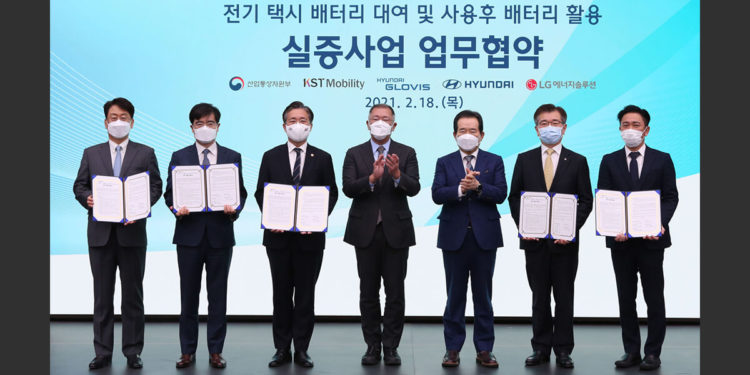South Korea’s Ministry of Trade, Industry, and Energy (MOTIE) signed a memorandum of understanding with Hyundai Motor, LG Energy Solution, KST Mobility, and Hyundai Glovis. Under the agreement, the groups would work together for a business model involving leasing and reusing electric vehicle (EV) batteries.
At Hyundai’s Namyang R&D Center, various government and company officials attended the signing, including Prime Minister Chung Sye-Kyun. Other attendees include MOTIE’s Minister, Hyundai Motor Group’s Chairman, LG Energy Solution’s President, KST Mobility’s CEO, and Hyundai Glovis’ President.
“We will set this year as the starting point in the era of eco-friendly cars and speed up innovation in supply and demand so that local companies can establish themselves as first-movers in the global market,” said Prime Minister Chung. According to Chung, the EV battery lease and reuse would increase EV operation and launch new businesses. Moreover, the group’s innovative business model would help in minimizing greenhouse gas and air pollutant emission.
Through the MOU, MOTIE and the companies would establish an EV battery rental business for electric taxis. The EV taxis will charge the batteries through energy storage systems (ESS) produced from used Kona cells. The group’s agreement would help reduce the initial costs of purchasing EVs, further promoting eco-friendly EV utilization.
Electric Vehicle Battery Lease
In the battery lease program, KST Mobility will buy Kona Electric units from Hyundai Motor Group. After purchasing the units, KST Mobility would sell the battery ownership to Hyundai Glovis, which operates the battery rental services. KST Mobility would give a monthly payment to Hyundai Glovis for using the EV batteries, cutting their initial EV-purchase costs.
After recovering the used-up batteries, Hyundai Glovis would sell them to LG Energy Solution, which would examine the safety and residual values. LG Energy Solution would then reuse the depleted batteries and develop them into ESS units that function as fast-charging sources. Next, KST Mobility will buy the ESS charging units for the electric taxis, allowing the company to optimize electricity costs. All members of the MOU will have access to the EV driving and battery data.
Following the sustainable battery leasing and reusing project, the companies expect a rise in battery electric vehicle (BEV) sales. Due to the exclusion of battery costs, the battery lease service allows customers to buy BEVs at a lower price. Aside from lowering BEV prices, the MOU also showcases the safety and benefits of EV expansion.







